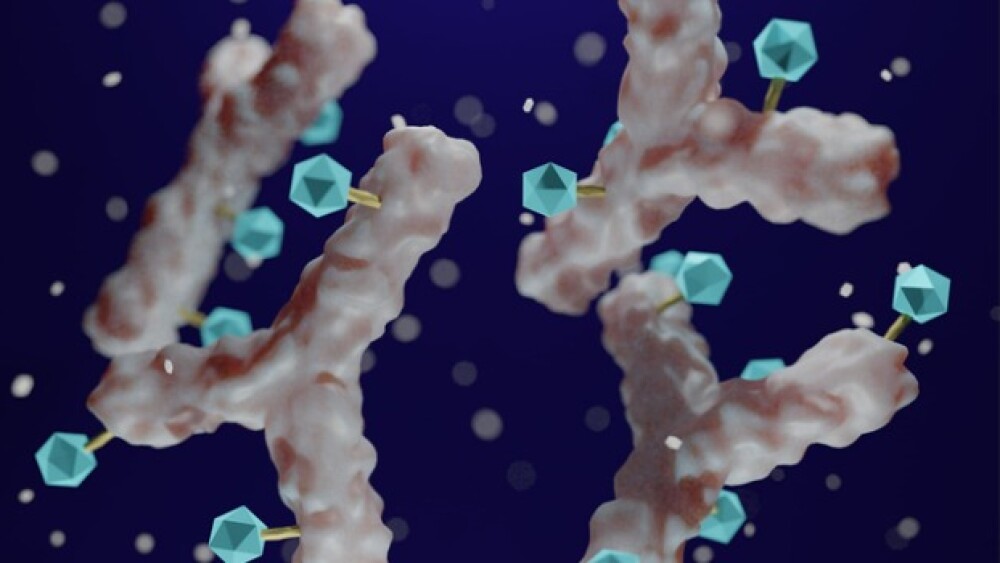With the investment in the plant, Daiichi Sankyo is looking to create new laboratories for its antibody-drug conjugates used to develop and manufacture therapies for breast, lung and stomach cancers.
Pictured: 3D illustrations of antibody-drug conjugates carrying cytotoxic payloads/iStock, Love Employee
Daiichi Sankyo is investing approximately $1 billion into its manufacturing facility in Germany, primarily to boost its capacity for producing antibody-drug conjugates, the company announced Friday.
The plant is in Pfaffenhofen an der Ilm, a municipality north of Munich. Daiichi Sanyko’s additional funding is meant to turn the facility into an international innovation center, with new laboratories dedicated specifically for its antibody-drug conjugates (ADCs). The building construction is expected to be completed by the end of 2026.
The investment will also create at least 350 new jobs by 2030, including positions for top international scientists, process engineers and other biotechnology specialists, according to the announcement.
With the $1 billion boost, Daiichi Sankyo is looking to eventually develop and manufacture novel cancer therapies targeting lung, stomach and breast cancers—among others—at the German production site.
The Pfaffenhofen facility is one of Daiichi Sankyo’s largest campuses in the world for the production of clinical products. It not only produces pharmaceutical products but also conducts R&D work, such as formulating additional dosages, establishing production processes to produce active ingredients at an industrial scale and developing new analysis methods to ensure product quality.
Aside from enhancing the cancer capabilities of the Pfaffenhofen facility, the company said the funding will also help strengthen the logistics and quality assurance systems of the campus, as well as allow it to implement additional sustainability mechanisms including adopting more renewable energy sources.
Daiichi Sankyo’s investment will help the company maintain its leadership in the ADC space. An August 2023 report from data analytics firm GlobalData showed that the Tokyo-headquartered pharma will be far and away the most dominant force in the ADC space by 2029, with nearly $11 billion in global annual sales.
Trailing distantly in second place is Seagen, which GlobalData forecasts will make around $5.76 billion in global sales by 2029, followed by Roche with $3.58 billion.
Daiichi Sankyo’s ADC business is anchored by its blockbuster breast cancer therapy Enhertu (fam-trastuzumab deruxtecan-nxki), which in the first three quarters of the company’s fiscal year 2023 brought in more than $1.51 billion in revenue.
Late last month, Enhertu scored the FDA’s Priority Review for its supplemental Biologics License Application, which seeks an approval in unresectable or metastatic HER2-positive solid tumors. Enhertu is being developed and commercialized in partnership with AstraZeneca.
Given its strong market and clinical performance, Daiichi Sankyo raised its full-fiscal-year sales forecast for Enhertu, now expecting the therapy to secure $2.61 billion for the fiscal year 2023, driven primarily by its growth outside the U.S.
Aside from Enhertu, Daiichi Sankyo is developing at least seven more investigational ADCs. On Monday, the FDA accepted the BLA for another AstraZeneca-partnered ADC, datopotamab deruxtecan, for the treatment of locally advanced or metastatic nonsquamous non-small cell lung cancer. The target decision date is on Dec. 20, 2024.
Tristan Manalac is an independent science writer based in Metro Manila, Philippines. Reach out to him on LinkedIn or email him at tristan@tristanmanalac.com or tristan.manalac@biospace.com.






